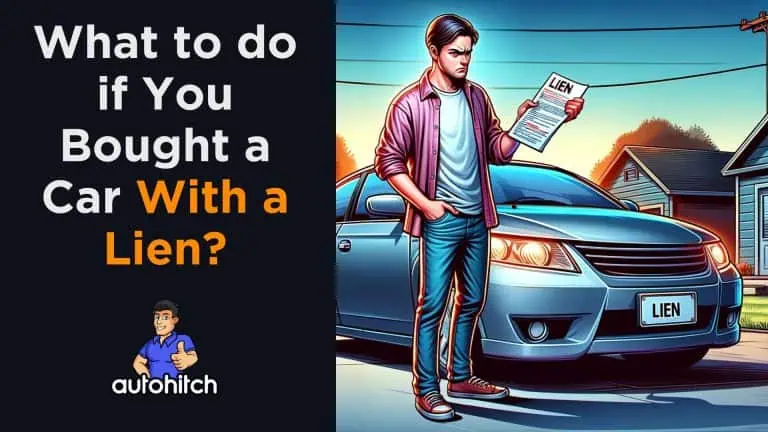If someone sold you a car with a lien on it, you have a few options to resolve the issue and protect yourself legally and financially.
The most important steps are to contact the lienholder (usually a bank or finance company) and the seller immediately to determine the best way forward.
If the seller knew they were selling you a car with money still owed on the lien, then see the section on legal options further down.
Table of Contents
What to do if Someone Sold you a Car with a Lien on it
Here are your main options:
Option 1: Pay Off the Lien and Keep the Car
If you want to keep the car, one option is to pay off the remaining balance on the lien yourself.
Obviously, this means spending more than you thought you would for the car, but this will allow you to obtain a clear title in your name and avoid potential repossession by the lender.
Here are the steps:
- Contact the lienholder to get the exact payoff amount and instructions for payment.
- Negotiate with the seller to deduct the payoff amount from the purchase price, since they failed to disclose the lien.
- Pay the lienholder directly, either with cash or by securing a new loan in your name.
- Obtain confirmation of the lien release from the lienholder.
- Transfer the title to your name with the state DMV.
Option 2: Have the Seller Pay Off the Lien
The seller is ultimately responsible for paying off the lien before selling the car to you, but this doesn’t mean you can’t still lose the car to the bank.
You can, however, demand that they resolve the issue. Here are the steps:
- Contact the seller and firmly request they pay off the balance immediately and provide proof.
- If the seller agrees, get a commitment in writing on when and how they will resolve the lien.
- Do not make any further payments to the seller until they provide an official lien release.
- Once the lien is cleared, obtain the title from the seller and transfer it to your name.
Option 3: Unwind the Sale and Return the Car
If the seller refuses to pay off the lien, or if you no longer want the car, you can try to unwind the sale. This essentially means returning the car to the seller and demanding your money back.
If the seller cooperates, here is how you handle the return:
- Notify the seller in writing that you are returning the car due to the undisclosed lien.
- Deliver the car back to the seller, taking photos and notes to document the condition and mileage.
- Demand a full refund of your purchase price, taxes, fees, and related costs.
- If the seller refuses to cooperate, you may need to take legal action, such as filing a claim in small claims court. (See legal options below)
Option 4: Surrender the Car to the Lienholder
If the seller defaults on the loan, the lienholder may repossess the car – even if you’ve been making payments to the seller or paid them off in full.
To avoid an extremely embarrassing and potentially inconvenient repossession:
- Contact the lienholder and explain the situation.
- Voluntarily surrender the car to avoid any legal action by the lender.
- Provide the location and keys to the lienholder so they can pick up the car.
- Send a written notice to the lienholder documenting your surrender of the vehicle.
- Pursue a refund from the seller for payments made and costs incurred.
The most important thing you can do here is to communicate proactively with all parties and keep detailed records.
Future Tip: Additionally, obtaining a vehicle history report and lien check before purchasing a used car could help you avoid this situation in the future.
If you believe the seller intentionally deceived you, let’s now discuss some legal options below:
Legal Options if You Bought a Car With a Lien
Can you sue the person who sold you a car with a lien on it?
Yes, if someone sold you a car with an undisclosed lien, you will most likely be able to file some sort of lawsuit against that person.
Here are your main options:
- Small Claims Court: You can sue the seller in small claims court for breach of contract, fraud, or violation of state consumer protection laws. This is a good option if your damages are within the court’s limit (usually a few thousand dollars).
- Civil Lawsuit: For larger damages, you can file a civil lawsuit against the seller. An attorney can help you build a case for fraud, breach of contract, or other claims based on your state’s laws.
- Criminal Charges: If the seller intentionally deceived you, you can report them to law enforcement for criminal fraud. However, this won’t directly recover your money – you’ll still need to sue civilly.
To succeed in court, you’ll need to prove:
- The seller knew about the lien but failed to disclose it
- You relied on the seller’s misrepresentation when buying the car
- You suffered financial damages as a result
Evidence like the sale agreement, title documents, and communications with the seller will be neccasary to have here, because your word against theirs doesn’t win in court.
If you win, the court can order the seller to pay off the lien, refund your money, and cover your court costs.
Before suing, send a formal demand letter to the seller. This shows a good faith attempt to resolve the issue out of court. If the seller refuses to clear the lien or refund you, you’ll have a stronger case for lawsuit.
Sources
- https://www.reddit.com/r/askcarsales/comments/y4wx0j/dealership_sold_me_a_used_car_with_a_lien_on_the/
- https://www.ksrevenue.gov/dovlienfaq.html
- https://www.rocketauto.com/research/selling-a-car/how-to-sell-a-car-with-a-lien
- https://www.avvo.com/legal-answers/can-i-sue-the-person-that-sold-me-a-car-with-a-lie-5503156.html



